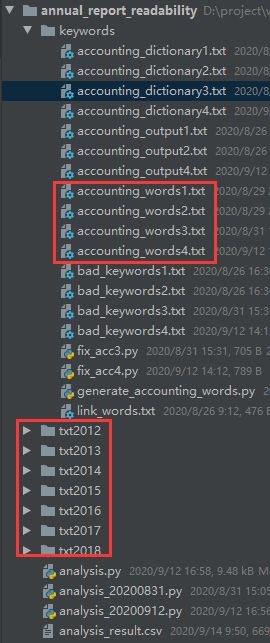利用jieba完成对年报可读性分析
年报可读性分析
- 需求
- 词典预处理
- 结巴加载词典,然后进行分词
- 后记
需求
目的:通过统计公司年报中的“会计专业词汇”以及“表示转折的连词”等内容,分析年报的可读性(会计词、转折词越多可读性较差),进而分析年报可读性对各方面的影响。
输入:年报(12年到18年)、词典(会计专业词典、连词词典)
输出:文章总字数、各词典在文章中出现的次数
词典预处理
本次分析采用的词典主要有5个:连词词典,两个灵格斯的会计词典,会计术语,会计科目
由于灵格斯的两个词典是专用的格式,需要借助工具先转换成txt格式,好处理一些。直接转换出的词典是一行中英文都有的,用代码简单的将英文过滤掉

结巴加载词典,然后进行分词
import jieba, csv, os, fnmatch
import codecs
# 获取该目录下所有文件的名字
def openfile(path):
txt_path_list = []
files = os.listdir(path)
for filename in files:
if not fnmatch.fnmatch(filename, '*.txt'):
continue
if fnmatch.fnmatch(filename, '*英文版*') or fnmatch.fnmatch(filename, '90*') or fnmatch.fnmatch(filename,
'*ST*') or fnmatch.fnmatch(
filename, '*修订*') or fnmatch.fnmatch(filename, '*更新*') or fnmatch.fnmatch(filename,
'*广告*') or fnmatch.fnmatch(
filename, '*取消*')or fnmatch.fnmatch(filename, '*印刷*'):
continue
if debug:
print(filename)
txt_path = os.path.join(path, filename)
txt_path_list.append(txt_path)
return txt_path_list
def get_txt(txt_path):
txt = open(txt_path, "r", encoding='ANSI').read()
txt = txt.replace("\n", "").replace(" ", "")
if debug:
print(txt_path)
txt_count = len(txt)
if debug:
print("总字数:", txt_count)
return txt, txt_count
# 开始分词
def do_jieba(txt):
# 载入词典
jieba.load_userdict("keywords\\link_words.txt")
jieba.load_userdict("keywords\\accounting_words1.txt")
# jieba.load_userdict("keywords\\accounting_words2.txt")
# jieba.load_userdict("keywords\\accounting_words3.txt")
jieba.load_userdict("keywords\\accounting_words3.txt")
words = jieba.lcut(txt) # 使用精确模式对文本进行分词
counts = {
} # 通过键值对的形式存储词语及其出现的次数
for word in words:
# if len(word) == 1: # 单个词语不计算在内
# continue
# else:
counts[word] = counts.get(word, 0) + 1 # 遍历所有词语,每出现一次其对应的值加 1
jieba_result = list(counts.items()) # 将键值对转换成列表
jieba_result.sort(key=lambda x: x[1], reverse=True) # 根据词语出现的次数进行从大到小排序
return jieba_result
# 提取关键词
def get_keywords():
# link_words_, accounting_words1_, accounting_words2_, accounting_words3_, accounting_words4_ = [], [], [], [], []
link_words_, accounting_words1_, accounting_words4_ = [], [], []
# 连接词提取
for i in open("keywords\\link_words.txt", "r", encoding="utf-8"):
i = i.replace("\n", "")
# if len(i) == 1: # 单个词语不计算在内
# continue
# else:
link_words_.append(i)
if debug:
print("连接词:", link_words_)
# 会计词提取1
for i in open("keywords\\accounting_words1.txt", "r", encoding="utf-8"):
i = i.replace("\n", "")
if len(i) == 1: # 单个词语不计算在内
continue
else:
accounting_words1_.append(i)
if debug:
print("会计词1:", accounting_words1_)
# 会计词提取2
# for i in open("keywords\\accounting_words2.txt", "r", encoding="utf-8"):
# i = i.replace("\n", "")
# if len(i) == 1: # 单个词语不计算在内
# continue
# else:
# accounting_words2_.append(i)
# if debug:
# print("会计词2:", accounting_words2_)
#
# # 会计词提取3
# for i in open("keywords\\accounting_words3.txt", "r", encoding="utf-8"):
# i = i.replace("\n", "")
# if len(i) == 1: # 单个词语不计算在内
# continue
# else:
# accounting_words3_.append(i)
# if debug:
# print("会计词3:", accounting_words3_)
# 会计词提取4
for i in open("keywords\\accounting_words4.txt", "r", encoding="utf-8"):
i = i.replace("\n", "")
if len(i) == 1: # 单个词语不计算在内
continue
else:
accounting_words4_.append(i)
if debug:
print("会计词3:", accounting_words4_)
# return link_words_, accounting_words1_, accounting_words2_, accounting_words3_, accounting_words4_
return link_words_, accounting_words1_, accounting_words4_
# 计算字数
def calculate_words(items):
link_count = 0
accounting_count1 = 0
accounting_count2 = 0
accounting_count3 = 0
accounting_count4 = 0
for i in items:
if i[0] in link_words:
if debug:
print(i, len(i[0]))
link_count += i[1] * len(i[0])
if debug:
print("连接词总字数:", link_count)
for i in items:
if i[0] in accounting_words1:
if debug:
print(i, len(i[0]))
accounting_count1 += i[1] * len(i[0])
if debug:
print("会计词总字数1:", accounting_count1)
# for i in items:
# if i[0] in accounting_words2:
# if debug:
# print(i, len(i[0]))
# accounting_count2 += i[1] * len(i[0])
# if debug:
# print("会计词总字数2:", accounting_count2)
#
# for i in items:
# if i[0] in accounting_words3:
# if debug:
# print(i, len(i[0]))
# accounting_count3 += i[1] * len(i[0])
# if debug:
# print("会计词总字数3:", accounting_count3)
for i in items:
if i[0] in accounting_words4:
if debug:
print(i, len(i[0]))
accounting_count4 += i[1] * len(i[0])
if debug:
print("会计词总字数3:", accounting_count4)
# return link_count, accounting_count1, accounting_count2, accounting_count3
return link_count, accounting_count1, accounting_count4
# 计算个数
def calculate_number(items):
link_number = 0
accounting_number1 = 0
accounting_number4 = 0
for i in items:
if i[0] in link_words:
if debug:
print(i, len(i[0]))
link_number += (1 + i[1])
if debug:
print("连接词总个数:", link_number)
for i in items:
if i[0] in accounting_words1:
if debug:
print(i, len(i[0]))
accounting_number1 += (1 + i[1])
if debug:
print("会计词总个数1:", accounting_number1)
for i in items:
if i[0] in accounting_words4:
if debug:
print(i, len(i[0]))
accounting_number4 += (1 + i[1])
if debug:
print("会计词总个数4:", accounting_number4)
# return link_count, accounting_count1, accounting_count2, accounting_count3
return link_number, accounting_number1, accounting_number4
# 保存数据到csv文件
def save_to_csv(field_list, data):
# 1. 创建文件对象
f = open('analysis_result.csv', 'w', encoding='utf-8-sig', newline="")
# f.write(codecs.BOM_UTF8)
# 2. 基于文件对象构建 csv写入对象
csv_writer = csv.writer(f)
# 3. 构建列表头
csv_writer.writerow(field_list)
# 4. 写入csv文件内容
# csv_writer.writerow(["l", '18', '男'])
# csv_writer.writerow(["c", '20', '男'])
# csv_writer.writerow(["w", '22', '女'])
for i in data:
csv_writer.writerow(i)
# 5. 关闭文件
f.close()
if __name__ == '__main__':
debug = 0
# 获取关键词
# link_words, accounting_words1, accounting_words2, accounting_words3 = get_keywords()
link_words, accounting_words1, accounting_words4 = get_keywords()
# 设置表头
# field_list = ["股票代码", "年份", "总字数", "连词字数", "会计词典1字数", "会计词典2字数", "会计词典3字数"]
field_list = ["股票代码", "年份", "总字数", "连词个数", "会计词典1个数", "会计词典4个数"]
# 最终结果
csv_result = []
# 文件夹名
path_list = ["txt2012", "txt2013", "txt2014", "txt2015", "txt2016", "txt2017", "txt2018"]
for path in path_list:
year = path[3:] # 年份
txt_path_list = openfile(path)
for i in txt_path_list:
shares_num = i[8:14] # 股票号
txt, txt_count = get_txt(i) # 年报和字数
jieba_result = do_jieba(txt)
# link_count, accounting_count1, accounting_count2, accounting_count3 = calculate_words(jieba_result) # "连词字数", "会计词典1字数", "会计词典2字数", "会计词典3字数"
link_count, accounting_count1, accounting_count4 = calculate_number(jieba_result) # "连词字数", "会计词典1字数", "会计词典2字数", "会计词典3字数"
# csv_result.append([shares_num, year, txt_count, link_count, accounting_count1, accounting_count2, accounting_count3])
# print([shares_num, year, txt_count, link_count, accounting_count1, accounting_count2, accounting_count3])
csv_result.append([shares_num, year, txt_count, link_count, accounting_count1, accounting_count4])
print([shares_num, year, txt_count, link_count, accounting_count1, accounting_count4])
# break
# break
print(csv_result)
save_to_csv(field_list, csv_result)
print("save to csv success!")
后记
代码很简单,主要是记录下帮朋友提供论文数据的过程,有需要词典和年报的同学可以留言联系我。
